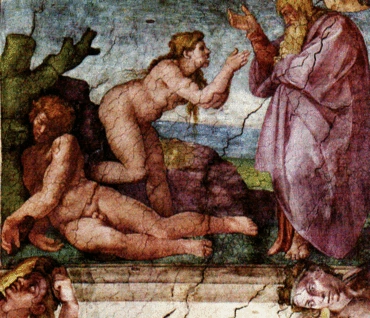Explanation of Genesis 2:22
വഴി Brian David

The Lord is life itself. We are recipients of life. We give life unique forms because of our unique shapes as receptacles, and through free will we can choose how fully we will receive life. But we don't have life of our own. It follows from this that the more we turn toward the Lord and receive life, the more alive we will be; and the more we turn away the more dead we will be. It also follows that believing life is our own – with all the loves, the thoughts and the power that entails – is actually the antithesis of life.
This is the state of those in the deepest hells, who reject everything of the Lord, even His existence, and claim all life as their own. They are, in fact, only alive because the Lord forces life on them in the amount necessary to sustain existence.
This is, in a sense, what is represented by the rib – which is human, and is alive, but only in the most limited way. When the people of the Most Ancient Church (Adam) wanted to lead themselves and sense life as their own, the Lord had to use that most dead aspect of them to grant their wish. He had to use that bone, which represents our most hellish potential, what we would be if we were to reject the Lord completely.
But then the Lord did something miraculous. He turned that bone into living flesh, into a new person: the woman Eve. This represents that the Lord built that most dead, most hellish aspect of us up into something which felt life as its own, but could acknowledge that life actually came from the Lord, and could thus again be a recipient of life. It wasn't quite as pure as before; people could no longer commune directly with the Lord. But they had what they wanted instead: a sense of self.
The Writings call this – both the rib and the woman – by the Latin word proprium, essentially meaning "as of self." The rib represents the proprium on its own, which is hellish. The woman represents the proprium given life by the Lord.
(റഫറൻസുകൾ: Arcana Coelestia 151, 152, 153, 154, 155)
Arcana Coelestia #3494
3494. 'And he called Esau his elder son' means the affection for natural good, or the good of life. This is clear from the representation of 'Esau' as the Divine Good of the Natural, dealt with in 3300, 3302, 3322. And because the good of the natural is that which manifests itself in affection and life, it is accordingly the affection for natural good, or the good of life, that 'Esau' represents here. The affection for good in the natural and consequently the good of life is that which is called 'the elder son', whereas the affection for truth and consequently the doctrine of truth is that which is called 'the younger son'. The fact that the affection for good and consequently the good of life is the elder son, that is, the firstborn, is quite evident from the consideration that good reigns in anyone's children at first. Indeed they are in a state of innocence, and a state of love towards their parents or nursemaid, and a state of mutual charity towards playmates, so that good is the firstborn with everyone. This good which is fostered in this state within a person when he is a small child remains with him, for whatever is instilled in infancy acquires life to itself; and because it remains it becomes the good of life. Indeed if a person were devoid of such good as he has had with him from earliest childhood he would not be human but would be more savage than any wild animal of the forest. Not that its presence is apparent, for everything that has been instilled in earliest childhood inevitably appears to be something natural, as is quite evident from being able to walk, from all our other bodily movements, and from the right and proper ways to behave among other people; also from being able to talk, and from so many other abilities. From this it may be seen that good is 'the elder son', that is, the firstborn, and truth therefore 'the younger son', or one born later, for truth is not learned until childhood, adolescent, and adult years are reached.
[2] Each of them, good and truth in the natural or external man, is 'a son', that is to say, a son of the rational or internal man, for whatever comes into being in the natural or external man flows in from the rational or internal man, and from there comes into being and is born. That which does not come into being and is not born from there is not living and human, but is like what you might call body and senses without a soul. Hence both good and truth are called 'sons', and indeed sons of the rational. Yet it is not the rational that produces and gives birth to the natural, but an influx by way of the rational into the natural, an influx coming from the Lord. His 'sons' therefore are all the young children who are born, and after that time whenever they become wise. Also, insofar as the latter are at that time 'young children' - that is, insofar as the innocence of a young child, the love of a child for its parent (who is now the Lord), and mutual charity towards playmates (who are now the neighbour) exist in them, they are adopted by the Lord as 'sons'.






